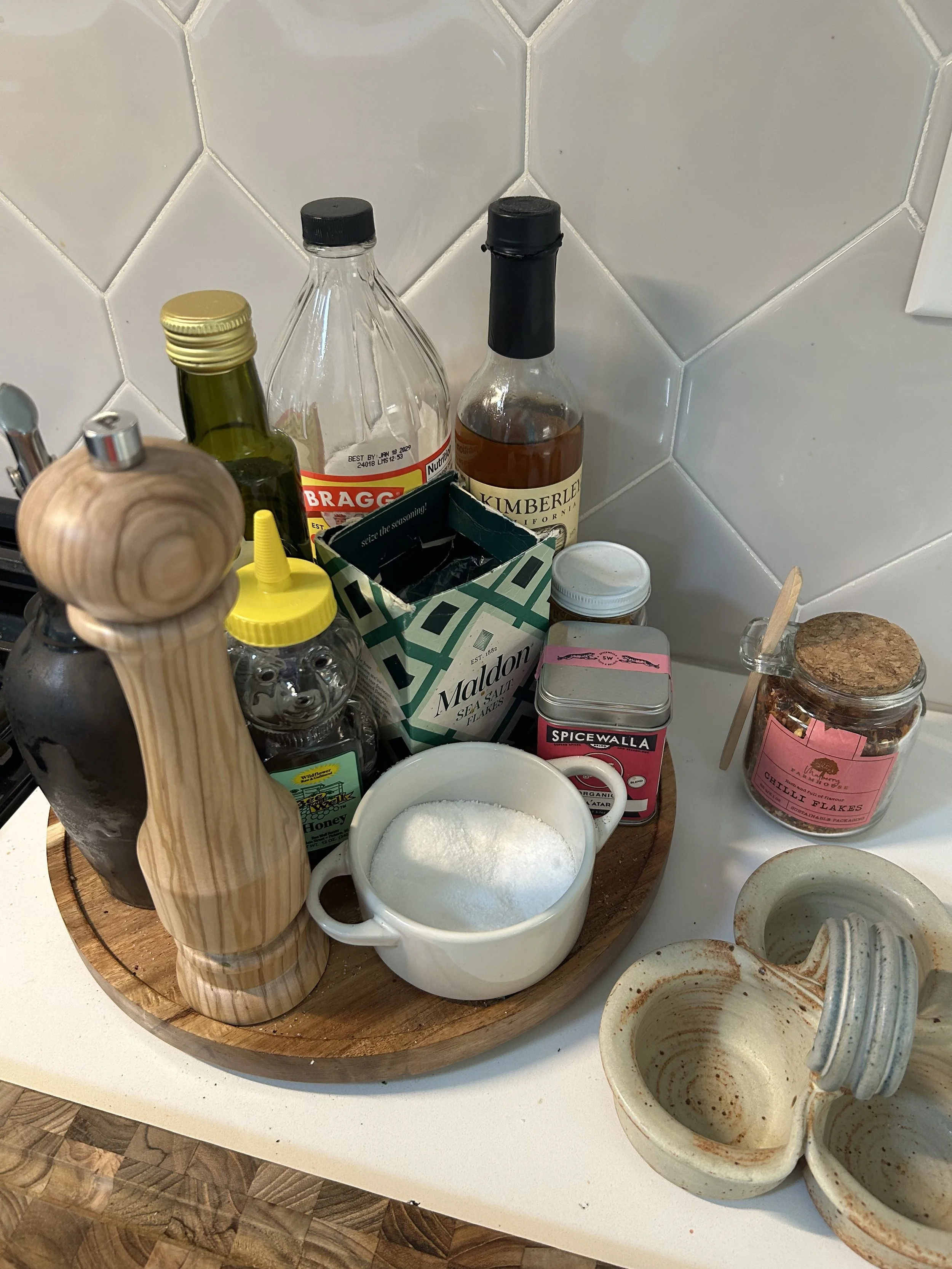salt, fat, heat, acid
salt, fat, heat, acid
There are 5 main components I find essential that will always have a permanent home on my counter
When I first envisioned this page on the website, I saw it as “utilizing a lazy susan as your sous chef”, because for years I had been cultivating a lazy susan to the right of my stove that had every essential ingredient I needed when making a recipe. Think of the go-tos you use for almost every recipe: salt, oil, acids, and seasonings. I wanted to evolve this idea to be a jumping-off point for creating the essential ingredients for your kitchen and exploring the options you have within each category. I’ve also included a bit of “whys” behind my choices for certain ingredients that have become integral in my kitchen. Here’s our guide to the essential ingredients every chef should consider adding to their counter permanently, lazy susan or not:
Oil: Having a wide variety of oils to add fat to your dishes, sear, and sauté proteins and vegetables is essential to being a successful cook. Different types of oil succeed in different applications, and it’s important to use each one to optimize the results of your dishes. These are the three oils I’ve discovered that add the best flavor to dishes, work the best when cooking at a high temperature, and add something special to the food I create with them:
Olive oil is a classic oil utilized in many recipes for a reason. These days I actually find myself with two different kinds of olive oil on my counter — one for sautéing and one very high-quality extra virgin olive oil for finishing dishes and creating flavorful vinaigrettes. As a rule of thumb, olive oil has a low smoke point, typically around 350-450, depending on the blend, so it’s best to use this oil in low-temperature applications.
Avocado oil is very neutral in flavor and can be used to cook at a very high temperature. The smoke point for avocado oil is 520 degrees, meaning that it won’t start smoking when you’re using it to cook until you reach that temperature. This makes avocado oil a great option for high-heat cooking methods such as grilling. Because of its neutral flavor, I also love utilizing avocado oil in baking.
Coconut Oil is similar to olive oil in that it has a lower smoke point (around 350-400 degrees, depending on the variety), but it adds wonderful flavor to dishes. My favorite way to utilize coconut oil is either in baked goods, where the aromatic flavor of the coconut oil will complement the flavors of the baked good or for sautéing vegetables for the base of a stir fry or stew.
Salt: Similarly to olive oil, I have a structure with my salts where I have one high-quality, flaky sea salt for finishing dishes, and I use Diamond Kosher salt for everything else. Different salt brands vary in salinity, and Diamond Kosher Salt is the standard almost every chef will use to develop recipes and guide on seasoning.
Black Pepper: Fresh cracked. There’s no other way. I recommend investing in a good-quality pepper mill — you’ll keep it forever.
Honey: This is an area where I find it very fun and impactful to play around. You can often find different types of honey based on what flowers the bees were pollinating, and the flavor of the honey will vary significantly between these varieties. I always have at least one local, wildflower honey on hand to grab for any recipe.
Vinegar: In my opinion, there’s a holy trinity of vinegars that you should have at hand: apple cider vinegar, rice vinegar, and balsamic vinegar. The reasoning behind these choices is simple:
Apple cider vinegar is a classic for finishing a dish, making a versatile vinaigrette, or anything in between. It’s punchy, but not too savory, so it adds a well-rounded flavor to any dish. I also use this as my go-to for pickling red onions.
Rice vinegar is one of my favorite neutral vinegars. I love this vinegar to make a savory cucumber salad or even added to a stir fry. The benefit here is that the flavor of this vinegar is very neutral and savory; it won’t add any additional sweetness to your dish like balsamic and apple cider vinegar can do.
Balsamic vinegar is incredible for topping fresh sliced tomatoes in the summer (bonus points if you add a fresh mozzarella or burrata cheese to go with it). Think of this vinegar as your fancy finishing touch vinegar. It’s perfect for finishing roasted Brussels sprouts, and you can even reduce it down in a saucepan to create a beautiful, rich glaze.
Now that you know all about the ingredients we see as essential, check out our archive of recipes that we see as essential to master along your cooking journey! We call this our back-to-basics recipes.




